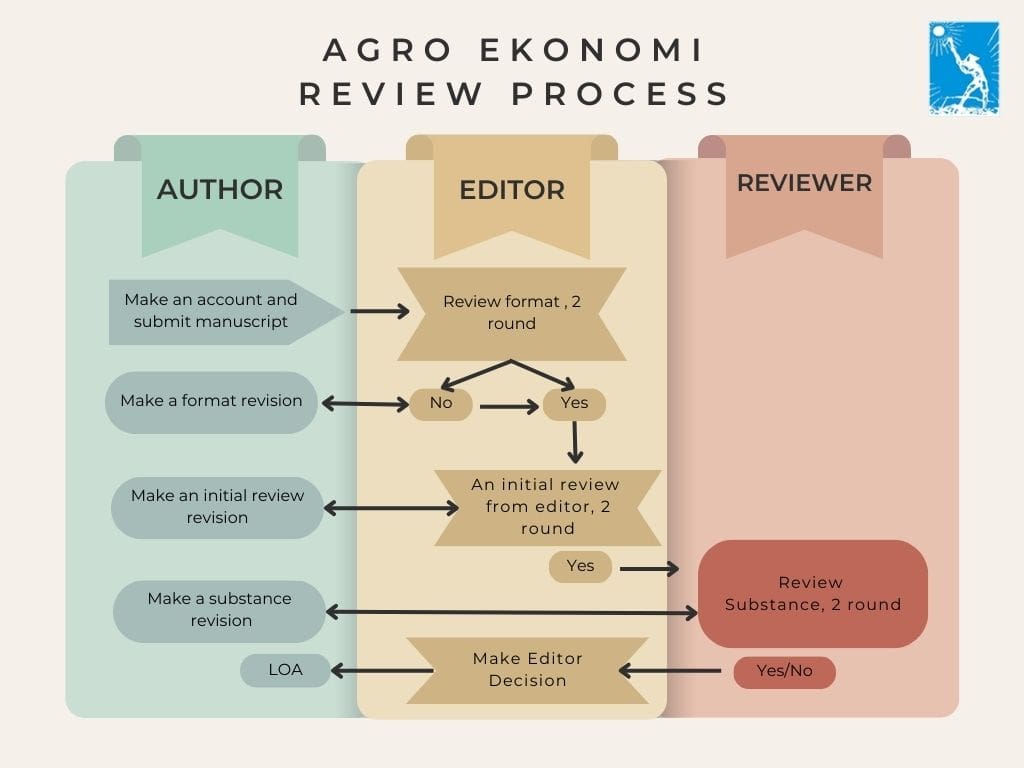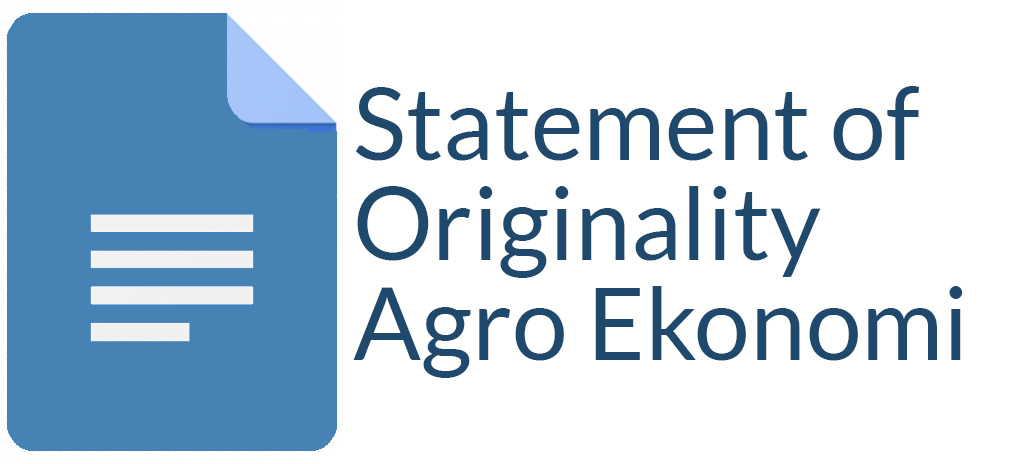Technical Efficiency Of Smallholders Of Oil Palm Cultivation In Ogan Komering Ilir
Armina Fariani(1*), Jamhari Jamhari(2), Any Suryantini(3)
(1) Student of Postgraduate Program of Faculty of Agriculture, University Gadjah Mada
(2) Lectures of Faculty of Agriculture, University Gadjah Mada
(3) Lectures of Faculty of Agriculture, University Gadjah Mada
(*) Corresponding Author
Abstract
This study aims to (1) identify the factors affecting the production of oil palm cultivation business by the smallholders and (2) identify the technical level as well as factors influencing business inefficiency of oil palm cultivation by the smallholders in Air Sugihan Sub District of Ogan Komering Ilir Regency, South Sumatera Province. This research uses the basic method of analytical descriptive method. The data were collected by way of observation and direct interviews in the field guided by a questionnaire. The research location was determined purposively, that is in Pangkalan Damai Village, Air Sugihan Sub-district, Ogan Komering Ilir Municipality, South Sumatera Province. Sampling was conducted using non probabilistic sampling method (purposive sampling). The research investigated 79 smallholder farmers of oil palm cultivation in Pangkalan Damai village of Air Sugihan Sub-district, Ogan Komering Ilir Municipality, South Sumatera Province. On the basis of the analysis, it is revealed that (1) the factors affecting the increase of palm production were labor, land area, TSP fertilizer, NPK fertilizer, organic fertilizer, herbicides and insecticides which also have an effect on decreasing palm production. (2) Palm plantation business was technically efficient with the average technical level of smallholder palm farmers in Air Sugihan Sub-district of Ogan Komering Ilir Municipality of 0.86090. Factors that decrease the technical inefficiency in smallholder palm cultivation in Air Sugihan Sub-district of Ogan Komering Ilir Regency were farmers’ education level. This information can be used by the goverment to improve technical efficiency through education in the form of counseling and training to increase production.
Keywords
Full Text:
PDFReferences
Adnan, I. S., Utoyo, B., & Kusumastuti, A. (2015). Pengaruh Pupuk NPK dan Pupuk Organik terhadap Pertumbuhan Bibit Kelapa Sawit (Elaeis guineensis Jacq.) di Main Nursery. Jurnal Agro Industri Perkebunan, 3(2), 69–81.
Agency, C. S. (2017). Sumatera Selatan Province In Figure 2017.
Alfayanti, & Efendi, Z. (2013). Analisis Faktor - Fakktor yang Mempengaruhi Produksi Kelapa Sawit Rakyat di Kabupaten Mukomuko. AGRISEP, 13(1), 1–10.
Alwarritzi, W., Nanseki, T., & Chomei, Y. (2015). Analysis of The Factors Influencing The Technical Efficiency Among Oil Palm Smallholder Farmers in Indonesia. Procedia Environmental Sciences, 28(SustaiN 2014), 630–638. https://doi.org/10.1016/j.proenv.2015.07.074
Ardiansyah, N., Hartono, S., & Suryantini, A. (2018). Technical Efficiency of Soybean in Pandeglang Regency. Agro Ekonomi, 29(1), 1–17.
Coelli, T. J., Rao, D. S. P., O’Donnell, C. J., & Battese, G. E. (2005). An Introduction to Efficiency and Productivity Analysis, Second Edition (2nd ed.). Springer US. https://doi.org/10.1007/b136381
Essilfie, F. L., Asiamah, M. T., & Nimoh, F. (2011). Estimation of Farm Level Technical Efficiency in Small Scale Maize Production in The Mfantseman Municipality in The Central Region of Ghana : A Stochastic Frontier Approach. Journal of Development and Agricultural Economics, 3(14), 645–654. https://doi.org/10.5897/JDAE11.069
Hartatik, W., Husnain, & Widowati, L. R. (2015). Peranan Pupuk Organik dalam Peningkatan Produktivitas Tanah dan Tanaman. Jurnal Sumberdaya Lahan, Vol 9 No 2, 107–120.
Hoffmann, M. P., Donough, C. R., Cook, S. E., Fisher, M. J., Lim, C. H., Lim, Y. L., … Oberthür, T. (2017). Yield Gap Analysis in Oil Palm : Framework Development and Application in Commercial Operations in Southeast Asia. Agricultural Systems, 151, 12–19. https://doi.org/10.1016/j.agsy.2016.11.005
Nufvitarini, W., Zaman, S., & Junaedi, A. (2016). Pengelolaan Gulma Kelapa Sawit (Elaeis guineensis Jacq.) Studi Kasus di Kalimantan Selatan. Buletin Agrohorti, 4(1), 29–36.
Purba, S. T. Z., Damanik, M., & Lubis, K. S. (2017). Dampak Pemberian Pupuk TSP dan Pupuk Kandang Ayam Terhadap Ketersediaan dan Serapan Fosfor Serta Pertumbuhan Tanaman Jagung Pada Tanah Inceptisol Kwala Bekala. Jurnal Agroekoteknologi FP USU, 5(3), 638–643.
Ridho, Z., Hadi, S., & Yusri, J. (2014). Efisiensi Produksi Kelapa Sawit Pola Swadaya di Desa Senama Nenek Kec Tapung Hulu Kabupaten Kampar. JOM Faperta Unri, 1.
Rizka, E., Sakti, H., & Arifudin. (2014). Faktor-Faktor Yang Mempengaruhi Minat Petani Kelapa Sawit Rakyat Berpartisipasi Dalam Sertifikasi Produk Di Kabupaten Kampar. SEPA, 11(1), 142–150.
Salmiyati, S., Heryansyah, A., Idayu, I., & Supriyanto, E. (2014). Oil Palm Plantations Management Effects on Productivity Fresh Fruit Bunch ( FFB ). APCBEE Procedia, 8, 282–286. https://doi.org/10.1016/j.apcbee.2014.03.041
Septianita. (2009). Faktor-Faktor yang Mempengaruhi Produksi Kelapa Sawit (Elaeis quinensis Jack) dan Kontribusinya Terhadap Pendapatan Keluarga di Desa Makartitama Kec. Peninjauan Kab. OKU. Agronobis, 1(2), 78–85.
Sinulingga, E. S. R., Ginting, J., & Sabrina, T. (2015). Pengaruh Pemberian Pupuk Hayati Cair dan Pupuk NPK Terhadap Pertumbuhan Bibit Kelapa Sawit di Pre Nursery. Jurnal Online Agroekoteknologi, 3(3), 1219–1225.
Syahputra, E. (2011). Aktivitas dan Keefektifan Insektisida Berbahan Aktif Majemuk Thiodicarb dan Triflumuron Terhadap Hama Ulat Kantong Metisa Plana Pada Tanaman Kelapa Sawit. Jurnal Perkebunan Dan Lahan Tropika, 1(2), 1–8.Article Metrics
Refbacks
- There are currently no refbacks.
Copyright (c) 2018 Agro Ekonomi

This work is licensed under a Creative Commons Attribution-ShareAlike 4.0 International License.
View My Stats











